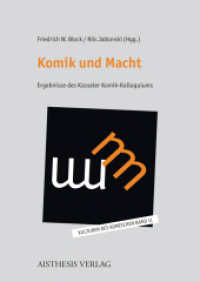Full Description
This book aims to rethink the intersection between inclusion and gender in civil society, media, academic and policy discourses across Europe.
With a critical and participatory approach, this book advances the concept of 'situated intersectionality' to rethink empowerment as a dynamic process shaped by local contexts. Drawing on rich data from the Horizon Europe project ReIncluGen, this book examines discourses on gender empowerment and inclusion in Austria, Belgium, Italy, Poland, and Spain. From both academic and civil society perspectives, the volume explores how these discourses are addressed, as well as how they contribute to, or reduce, inequalities. These insights further our understanding, reflecting on innovative practices used by civil society and policymakers to foster social change.
This book assembles chapters that will be of interest to scholars and students of gender studies, sociology, migration, and media studies, as well as practitioners, policymakers, and CSOs working on issues of migration, diversity, equality, and inclusion. It offers valuable insights for anyone seeking to understand and support inclusive practices that foster a more equitable European future.
Contents
1. Introduction: A participatory approach to rethinking inclusion and gender Empowerment; Part I: Introducing situated intersectionality and the relevance of participatory research; 2. Power, Participation, and Positionality: A Situated Intersectional Approach to Gender Empowerment in the ReIncluGen project; 3. Power relations, participation, empowerment, and social work: How empowered are women allowed to become? 4. Gender empowerment: CSO's approaches and experiences of migrant women and girls; 5. (Un)Knowing and Understanding: Artistic Practices as Modes of Research; Part II: Situated attitudes, discourses and implementation of gender empowerment in Europe; 6. Migration as a Gender Equality issue? A Comparative Study on Gender Attitudes across Europe; 7. Reinforcing gender and migration-related stereotypes: A discourse analysis of five topics in printed media articles in Belgium and the Netherlands; 8. How civil society organisations approach empowerment in Flanders (Belgium): The role of positioning, organisational cultures and identities; 9. Navigating the Institutional Tightrope: The Case of Polish Women's Organizations; Part III: Practices and pathways of gender empowerment and inclusion in civil society; 10. Empowering women with migration background in Italy: experts and resource centres on their own journey; 11. The path to identify, dismantle and act: The importance of approaching educational practice from an intersectional perspective; 12. Theatre as empowering: from remembering to healing with migrantised women in Flanders; 13. The power of intersectoral collaboration, innovation and art-based tools in promoting gender equality and awareness. Lessons from Feminoteka; 14. The inherent power dynamics in empowering spaces: CSOs working with migrantised women in Austria; 15. Co-Creating Software for Inclusion and Gender Empowerment; 16. Conclusion: Empowerment revisited: Critical reflections across research, policy and practice








